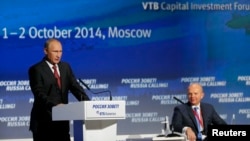President Vladimir Putin said on Thursday he hoped Ukraine's parliamentary poll, scheduled for October 26, would help restore stability in the country, saying that such a development would also be welcomed by Russia.
Relations between Moscow and Kyiv have been teetering on the brink since Russia annexed Ukraine’s Crimean peninsula in March and has since been seen as having fomented and directly supported a separatist rebellion in the country’s east, a charge Moscow denies.
“I hope Ukraine's parliamentary elections will be worthy and there will finally be long-awaited political stability,” Putin told VTB Capital “Russia Calling” investment forum in Moscow.
“Ukraine's exit from political and economic crisis is in Russia's national interests,” he added referring to Ukraine as Russia's “most brotherly” nation.
“We are tied together through an ethnic, spiritual, religious and historic commonality," said Putin.
Charges, counter-charges
At the same time, the Russian leader warned Ukraine that it can “preserve its territorial integrity and unity only if it guarantees the rights of all its citizens,” a clear reference to Ukraine’s ethnic Russians and Russian speakers, who Moscow claims are being discriminated against. Kyiv denies the allegation, accusing Russia of exaggerating and artificially inflaming tensions as part of efforts to destabilize Ukraine.
Ukrainians are seen as having turned their back on their former Soviet overlord when after months of massive protests they ousted Russia-backed president Viktor Yanukovych in February. Yanukovych, who fled to Russia, in November of last year spurned an association deal with the European Union in favor of a bail-out from Moscow. Ukraine’s new government has since signed the agreement, raising concerns in Moscow over its European course.
Meanwhile, in Ukraine’s still restive east, Pro-Russia rebel leaders, who do not recognize Kyiv’s sovereignty over territory they control, have already said the October 26 poll has no validity for them.
Swiss Red Cross worker killed
Shelling in the eastern Ukrainian city of Donetsk on Thursday killed a Swiss employee of the International Committee of the Red Cross (ICRC).
Western journalists in Donetsk and Russian news agencies reported that a building housing the local office of the ICRC in the center of the rebel-controlled city was hit during the shelling. The ICRC confirmed that a Swiss colleague had been killed in the barrage.
Heavy fighting was also reported Thursday in the area of the Donetsk airport, as pro-Russian separatists continued a push to retake the facility from government forces.
Sporadic fighting continued and has intensified this week in and around Donetsk. At least 10 people were killed Wednesday by heavy shelling in the city.
NATO on Russian troops in Ukraine
NATO says that hundreds of Russian troops remain inside Ukraine, including special forces, with some 20,000 soldiers still deployed near Ukraine’s border, Reuters cites an alliance spokesperson as saying.
Last week, NATO said it had observed a significant pullback of Russian conventional forces from inside Ukraine since an uneasy cease-fire took force on September 5.
But no further reduction of troop levels inside Ukraine have been noted within the last week, according to NATO military spokesman Lieutenant-Colonel Jay Janzen.
"Hundreds of Russian troops, including special forces, still remain inside Ukraine," he said.
"Around 20,000 Russian troops are still deployed in the vicinity of Russia’s border with eastern Ukraine," he added.
Russia has consistently denied it has sent troops into Ukraine. It once said that soldiers accidentally strayed into Ukrainian territory, and that others might be there as volunteers, in an off-duty status.
Bleak numbers for Ukraine’s economy
Ukraine's economy is likely to shrink by eight percent this year in view of the separatist conflict in the country’s industrial east, the World Bank predicted on Thursday.
“Disruption in economic activity in the east has resulted in a sharper GDP decline. We project that GDP will be an eight percent decline in 2014,” Qimiao Fan, the World Bank's chief representative for Ukraine, told reporters.
The conflict has hit steel, chemical and coal output in the eastern Donetsk and Luhansk regions which, according to Fan, together account for about 16 percent of the country’s GDP. Both regions are partially controlled by pro-Russia rebels, with fighting between the separatists and government forces continuing despite a cease-fire reached nearly a month ago.
The two regions account for about a quarter of Ukraine’s industrial output, seven percent of the agricultural sector and 27 percent of exports, according to World Bank figures.
Some material for this report came from Reuters.
